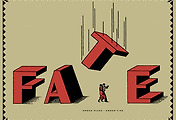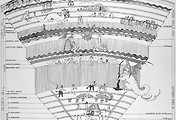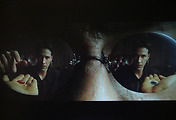*Parable of the Family that dwelt apart --- by E.B WHITE
이것이 바로 첫번째 스토리다. 멀리떨어져사는 가족의 우화? 뭐 대충 rough translation 등장인물은.. remote islad in the lower reaches of Barnetuck Bay 에 사는 한 가족.. Pruitt family.. 이들은 사회에 떨어져 생활한다. 자급자족생활이지. 겨울이 되면 강이 얼음으로 얼어서
시내에 우편을 가지러 나갈 수 없다. 뭐 별로 나가고 싶어하지도 않지만서도.. 그리고선.. 마을사람들이 한겨울날 갑자기pruitt 가족을 생각해냈다!! " 그인간들이 어떻게 그 외딴 섬에서 살까? 죽진 않을까? " 이런 얘기가 이리저리 무섭게 퍼져서결국 미군이 그 소식을 듣고
비행기로 식량을 싫어서 그 외딴 섬에 수송했다. 별로 맛은 좋지않았지만 맛있게 먹은 Pruitt 가족... 그리고 이리저리 일이 있은후..
한 파일럿이 추락 어쩌구 저쩌구.. 방송사사람들이 그 죽은 현장 촬영하러 왔다가 어쩌구 저쩌구 Pruitt 씨의 아들이 아픈걸 발견 시내로데려가 치료를 해야한다고했다.. 하지만.. 당연히 섬 밖으로 나가는 것을 거부하고 의사를 모시고왔다.(첫째와 둘째가 같이 아팠는데 첫째Charles는 나갔고, 둘째 Chester는 부엌에서 맹장수술을 받았다 그리고나서 죽었다.. 너무 급하게 수술뒤에 뭐를 먹어서.. 그리고 아빠는.. 의사가 놔둔.. 황산을 술인줄알고 먹고서 나머지 가족도 다 죽었다.
대충 이런 이야기 결말 짓자면, 좋은 뜻으로 줬던 도움이 결국 가족 몰살. 정말 이것이 Good 인가? -_- 그런 얘기..
* I called te devil and he came by Heinrich heine
이것은 poem 이다. Evil consequences canflow from the best of intentions; wanting to do good is not enough. or is it enough to trust the surface appearances of things to determine accurately what is good, what is evil. Apperances may deceive.
악하다는 것.. 악마! 하지만 악마는 과연 어떤 모습일까? 아마 우리가 상상하는 그런 무시무시한 모습은 아닐테지.. 양의 탈을 쓴 늑대.
본심을 보이기 전에는 뭐가 악이고 뭐가 선인지 모르는 그런것. 그것이 진정으로 악한 것이다. 이 시에서 heine 는.. 악마의 모습을 아주
아름다운것으로 묘사하려는듯하다.. 뭔가 밝고 뭔가 dangling 하는것. 다이아몬드 처럼. 하지만 본심을 보면 우리가 익히 알고있는 그 모습.. 뿔에다가 강한 근육! 그리고 날카로운 손톱과 차가운 눈빛 그리고 눈망울에서 흘러나오는 불꽃!! 크쓰오오오오! 대충 그런 거다..
갑자기 생각하ㅣ 단테의 Inferno 가 생각이 난다..
ABANDON ALL HOPE YE WHO ENTER HERE.
*The False Gems - by Guy de Maupassant
이 이야기는 정말 어찌보면 인생역적 드라마에 대한 얘기지만.. Good and evil 관점에서 보면 약간 어이없다..
M. Lantin 이라는 남자가 어떤 여자를 만나 결혼했다. 그 남자는 자기 부인을 정말 사랑했다. 부인은 정말 귀여웟고 앙증맞고 뭐 여러가지
좋은 수식어에 닥 적합한 여자였다. 부인으로서도 좋은 여자였다. 남자는 그냥 중급 공무원 이었던 걸로 기억한다. 두 부부가 먹고살만큼의 보수 그리고 평범한 중산층... 부인은.. 가사를 잘 돌보는 여자였다. 하지만 남편이 싫어하는 한가지 흠이있었다.. 바로.. 부인은
가짜 보석물을 모으는 취미가 있었다. 바로 일명"짜가" 거꾸로하면 가짜구만..-_-;; 하여튼 부인은 가짜 귀금속을 마구 마구 모았다.. 그리남편은 그걸 맘에 들어하지 않았다.. 그리고 한가지 더 남편이 싫어하는건..아내는 지루한 오페라를 좋아했다.. -_- 자기는 보기 싫은데 부인이 좋아하니 같이 보는 그런 상황이었다. 그러던 어느날..
One evening in winter she attended te opera and on her return was chilled through and through. The next morning she coughed, and eight days later she died of inflammation ofthe lungs.
부인은 죽엇고 남편은 너무 슬퍼서 머리가 흰색으로 변하기 막 빠지고 엄청 초췌한 모습이 되어버린것이다.. 자 이제 어떻게 할 것인가?
생각을 했다. 남편은 돈도 없고.. 자기 혼자 살아보려했지만 정말 절대로 불가능했다.. 자기 봉급으로 자기스스로를 먹여살리는것도..
그리고 그 순간 의심.. 어떻게 자기 부인은 그 많은 가짜 귀금속을 샀을까?? 그리고.. 결국 빚을 지고 absolute poverty에 빠진 남자는!
부인의 귀금속을 팔기로 결심한다.
One morning, finding himself without a cent in his pocket, he resolved to sell something, and immediately the thought occurred to him of disposing of his wife's paste jewels. He cherihed in his heart a sort of rancor against the false gems. They had always irritated him inthe past, and the very sight of them spoiled somewhat the memeory of his lost darling.
그리고 보석상에갔다. 그리고 그는 알게됏다.. 그녀의 보석이 엄청나게 비싼진짜 보석이라는점.. 하지만 이상황에서 남자는 슬픔에 빠진다.도대체 그녀는 그 보석을 어디서 얻었을까? 그리고 그 와중 보석상에서 한마디.. 내가 이 보석을 누구의 부탁으로 부인께 보내드렸습니다.. 결국 부인은.. 남편몰래 바람을 피던것이었다.. 내 추측에 의하면 분명 부인은 주말마다 그 외관남자와 오페라극장에서 만났음에 틀림없다. 여튼.. 남편은 실망과 자괴감에 빠져버렸다.. 하지만결국.. 부인이 남겨둔 귀금속이 자기를 위해 남기거라 위안 삼으며.. 직장에 사직서를 내고 떵떵거리며 살게된것이다..
부인의 외관남자와 바람피고 죽었다. 그리고 그 보석으로 사실을 알게되고.. 금전적으로 여유가있어진 남편.. 과연.. Good and Evil.. 부인의 바람피는것은..-_-;??
Evil deed 에서도.. 좋은 영향을 제 3자에게 끼칠 수 있다는 건가? -_-; 상당히 위험한 생각이군. ..
*Snake- by D.H.Lawrence
Man has pictured evil in many shapes. The devil himself assumed a serpent's form in the Garden of Eden, and most of us even now, whether justly or unjustly, feel at the sight of a snake --- that slithery, strange whiplash--- a feeling that emily dickinson called " zero at the bone." yet the chill feeling may not be entirely one of revulsion. At the same time tht e are repelled, we may be involuntarily attracted too.
이 시와 가장 어울리는 문구는 .. 바로 "악마의 유혹 프렌치카페" 이거다.. 잘 기억은 안난다 커피이름이 저게 맞는지조차..-_-
악마.. 꽤나 유혹적인 것이 많다.. 여러가지로.. 이시는 화자가 뱀이 자기의 물구덩이? 라고해야하나.. 구유? -_- 여튼 소들이 물먹는곳에서 물을 먹고있는 뱀의 모습을 보는 상황을 설명했다.. 뱀.. 당연히 우리가 배운대로라면 엄청 무시무시한 존재고 엄청난 맹독에다가!
당연히 머리를 공격! 하느것이 당연하지만.. 그는 왠지 그렇게 못했다.. 지하세계의 왕? 그것이 바로 뱀이다!-_- 이브의 타락! 우리 인간의 타락을 만든 악마의 후손! 하지만 결국에는 날카로운 창과같이 우리의 가슴을 꿰뚫을 그런 것이지..
그래서 화자는 유혹적이지만서도 가까이 가지 못할 존재. 뱀에게 마지막에는 통나무 조각을 던져버리고.. 자신의 배운 교육이 말한데로..
뱀에게 상처를 준다.
*Rashomon- by Ryunosuke Akutagawa
Man's instincts may not agree with what his reason tells him is evil. Bt the question of ditinguishing good fro evil pesents other perpelxities. Suppose, for instance, there i no choice in the matter; commit evil or die.
이건 꼭 그 얘기.. 아들을 먹여살리기위해 빵을 훔친 아버지.. 그 아버지가 Evil 인가? 뭐 그런식.. 절대로 피할 수 없는 악.. 그니깐 영화같은데 보면 나오는 꼭.. 내말을 따라! 아님 이여자는 저세상 행이야! 라는가.. 그런 종류.. 대부분 영화주인공들은 여자도 구하고 악당도 물리쳐서 그 악당이 시키는 일을 안해도 되지만서도.. 우리의 삶은 그렇게 쉽게 해결돼지 않으니깐. 그것이 문제. 배경은 도쿄 12세기..
일본의 사무라이.. 자기를 원하는 영주가 아무도 없으면 버려지는 존재. 그리고 그 사무라이를 쫓아다니는 라쇼몬 -_- 뭔지는 모르지만 꼭 옛날에 우리나라 암행어사를 쫓아다니는 그 뭐라하죠.. 정확한 용어는 모르겠으나.. 수행원정도? 의 사람의 이야기.. 어느날 라쇼몬.. 자기의 사무라이가 버려지자.. 먹을것이 없어지고.. 결국.. 이리저리 떠돌다.. 어느 한 무리의 용병들이 싸운 현장에 들어가고 거기에서 용병들의 머리를 벗기는 할머니를 만난다.. 당연히 라쇼몬 놀라서 뭔짓입니까!!!
할머니는 먹고살려고 이 머리로 가발을 만드는 중이다!!! ---- 꼭 베가본드에 나오는 한 모녀와 같음.. 죽은 사무라이들의 칼과 장비를 판다 전쟁터에서 훔쳐다가..--------- 여튼.. 라쇼몬 인간으로서 못할 짓.. 이짓저짓 설교하다가!!! 할머니가 .. 나 안하면 굶어죽으니깐 하는거야! 이건 악이아니야! 그러쟈 라소몬 왈 " 그럼내가 당신에게 강도짓을 하겠소 안하면 난 굶어죽으니깐" 그리고 강도짓을 하고선 할머니를 내팽겨치고 도망쳤다.
-_- 과연.. Evil.. 필요악이라고 하지. 어쩔 수 없이.. 적과의 동침.. 이게또 생각나네.. 윈스턴 처칠이 하신 말씀중..
거짓이라는 것은 정치에 있어 필요악이다.
뭐 이런 말씀을 하셨지.. 연합군이 독일 공격하는데 있어서.. 거짓으로 무슨 성명을 발표하셨는데.. 그 후에 하신 말씀...
거짓이라.. 과연. 정의를 위해 악을 행하는 것은 옳은 것인가??
*Good and Evil Reconsidered - by Friedrich Nietzche
Some of the most disturbing refletions on the nature of evil and good are contained in the works of the brilliant... it was nietzche who, in frequenly aphoristic and compellingpros, developed the concept of the super man. ... He distinguisehd in a good patrician fashion between masters and slaves, to whom good and evil mean quite different things. Hence, quesitions o morality he found to be reative, and he proceeded to demonstrat the conseqences of that conviction in writings that were intended to be read only by the lords themselves.......
기본내용 사람들마다 그 good and evil 의 가치관이 다르ㅏ. Rashomon 과 비슷하다.. 하짐나 라쇼몬은 악의 필요성.. 이것은 상황에 따라 다른 악과 선... 예를 들면, 히틀러.. 독일인에게는 영웅이자. 새로운 예수 그리스도. 세계를 휘두른 자. 하지만 유태인과 다른 대부분의 사람들에게는 살인마, 독재자. 등등.. 사람에 따라 morality에 대한 기준이 다르다..
The differenes in moral values depend on whether they come from a ruling class, comfortably aware of its detachment from its inferior,s or from the inferiors, slaves and deepedents of all kinds.
for this higher moral type, the contrast between "good" and "wicked" is the same as the contrast between " noble" and "common"
Master morality is alien and painful to present taste in the harshness of its principles, requirig a man to oweallegiance only to his equals. Maste moraity as do quiet cotempt for and distrust of fellow feeling and so-called warmhearts.
deep respect for their forefthers. hates modernizing.
There is a master morality and a slave morality. Noble.. people.. he honors everything that he finds in himself. such a morality is self-enobling.
The noble man does help unfortunates, but hardly or not at all from fellow feeling, rather from an impulse prompted by the abundance of his power. The noble man honors what is powerful in himself, for he who has power over himself understands hat to say and when to guard his tongue, struggles against his own nature with harsh, hard joy, and has revernce for all that is hars and hard.
slave moraity... he has skepticism, distrust, a refinement of distrst agisnt all the"good" that ought to be honored. joy itself isnot proper. noble man decides himself what is good or bad. He has knowledge to do so..
*Genesis: The Garden of Eden
성경입니다.. 창세기.. 어떻게 사탄이 사람을 타락시켰고.. Good and Evil 를 구분지었나.. 이브에게 선악과를 주었죠.. 냐핫햣..
선과 악에 대해선 할 말이 많다. 정말.. 이 모든 세상의 악이 결국 선악과땜시 나왔으니깐... 흠.. 흠.. 흠..
*Paradise Lost: Book IX
With Raphael's departure for heaven, th story no longer consists of conversations between heavenly beings and humankin. Milton explains that he must now turn to Adam and Eve's actual actof disobedience. The poem must now turn tragic, and Milton asserts his intention to show that the fall of humankind ismore heroic than the tales of virgil and homer. He invokes Urania, the "celestial Patorness" and muse of Christian inspiration, and asks for her to visit him inhis sleep and inspire his words, because he fears he is too old and lacks the creative powers to accomplish the task himself. he hopes not to get caughtup in the description of unimportant items, as virgil and homer did, and to rmain focused on his ultimate and divine task.
Satan returns to the garden of eden the night after raphael's depature, Satan's return comes eight days after he was caught and banished by gabriel. he sneaks in over the wall, avoiding Gabriel and the otherguards. After studying all the animals of the Garden. Satan considers what disguise he should assume, and chooses to become a snake before he can continue, however, he again hesitates-not because of doubt this time, but because of his grief at not being able to enjoy this wondrous new world. He struggles to control his thoughts. He now believes that the earth is more beautiful than Heaven ever was, and become jealous of Adam and Eve and their chosen status to occupy and maintain paradise. he gripes that the excess beauty of earth causes him to feel more torment and anguish. Gathering his thoughts into action, he finds a sleeping serpent andenters its body. The next morning, Adam and Eve prepare for their usual morning labors. Realizing that they have much work to do, Eve suggests that they work separately, so that they might get more work done. Adam is not keen on this idea. He fears that they will be more susceptible to Satan’s temptation if they are alone. Eve, however, is eager to have her strength tested. After much resistance, Adam concedes, as Eve promises Adam that she will return to their bower soon. They go off to do their gardening independently.
Satan, in the form of the serpent, searches for the couple. He is delighted to find Eve alone. Coiling up, he gets her attention, and begins flattering her beauty, grace, and godliness. Eve is amazed to see a creature of the Garden speak. He tells her in enticing language that he gained the gifts of speech and intellect by eating the savory fruit of one of the trees in the garden. He flatters Eve by saying that eating the apple also made him seek her out in order to worship her beauty.
Adam and Eve fall asleep briefly, but upon awakening they see the world in a new way. They recognize their sin, and realize that they have lost Paradise. At first, Adam and Eve both believe that they will gain glorious amounts of knowledge, but the knowledge that they gained by eating the apple was only of the good that they had lost and the evil that they had brought upon themselves. They now see each other’s nakedness and are filled with shame. They cover themselves with leaves. Milton explains that their appetite for knowledge has been fulfilled, and their hunger for God has been quenched. Angry and confused, they continue to blame each other for committing the sin, while neither will admit any fault. Their shameful and tearful argument continues for hours.
*Original Sin - by Robinson Jeffers
이건 한번에 이해가 안된다 그래서 그냥 써본다.
copyright는 당연히 Robinson Jeffers에게 있다.
The man-brained and man-handed ground-ape, physically
Themost repulsive of all hot-blooded animals
Up to that time of the world: they had dug a pitfall
/and caght a mammoth, but how could their sticks and stones
Reach the life in that hide? They danced around the pit, shriking
With ape excitement, flinging sharp flints in vain and the stench of their bodies
Stained the white air of dawn; but presently one of them
Remembered the yellow dancer, wood-eating fire
That guards the cave-mouth: he ran and fetched him, an others
Gathered sticks at the wood's edge; they made a blze
And pshed it into the pit, and they fed it high, arund the mired sides
Of their Huge prey, They watched the long hairy trunk
Waver over the stifle-trumpeting pain,
And they were happy.
지금까지 맘모스 사냥, 인간의 즐거움~ 오예~ 야만적인 즐거움! 너의 고통은 나의 기쁨!! 먹이감!!!
그런 이야기다..
그리고;..
Meanwhile th intense color and obility of sunrise,
Rose and gold and amber, flowed up the sky. Wet rocks were shining, a little wind
Stirred the leaves of the forest and the marsh flag-flowers; the soft valley between the low hills
Became as beautiful as the sky; while in its midst, hour after hour, the happy hunters
Roasted their living meat slowly to death.
아직도 고기얘기.. 지는 석양에 맘모스 고기를 먹는다! 왠지.. 맛있을듯하다.
These are the people.
This is the human dawn. As for me, I would rather
Be a worm in a wild apple than a son of man.
But we are what we are, and we might remember
Not to hate any person, for all are vicious;
And not to be astonished at any evil, all are deserved;
And not fear deah; it is he only way to becleansed.
오.. 시를 다쓰니 이해가 왔다.. 그리고 다시한번 말씀드리지만.. copyright is reserved to Robinson Jeffers
이야기.. 인간은 원래 사악하다.. 그리고 그 사악함을 어찌하라.. 방종해라.. 그리고 죽음...
그것이 우리를 이 사악함에서 구원해줄 유일한 열쇠다..
*Mario the Magician- by Thomas Mann
이 이야기는 슈퍼마리오가 아니라 마리오. 흥미도는 약간 떨어졌고 정말 정말 긴 이야기다.
이건 Facisim 를 criticize하기 위해 만든 글인다. 다음의 리뷰가 정리를 잘해놓아서 첨부한다.
A review by Ethan A. Bayer
Thomas Mann's frighteningly accurate sense of the future is crafted with great detail in Mario and the Magician. At the rise of Communism he is able to see past its exciting newness and into the horror that looms ahead.
Mann spends a significant portion of his story constructing a scene of Italy in the hot summer, laden with beach-going tourists. The narrator comments on the hostile demeanor of the natives and the unfriendly welcome he and his family receive. Through creating this world in all its coarse detail, Mann makes it possible for the reader to interpret the magician's show as reality.
In fact, the magician's performance (and the Nazi regime, if it is not too bold to say as much so quickly) is paralleled by the situation in Torre di Venere. After enduring a vehement attack on the beach, the narrator wonders that they should have left. However, he considers his decision to stay a mark of courage, and that to leave would show cowardice. No one feels confident in leaving a place just as the air becomes a bit tense, least of all the German Jews, whose whole lives were cemented in Germany. The narrator recalls the saying that "it is indolence that makes us endure uncomfortable situations" (p.537).
Ironically, the narrator feels things picking up when they are actually headed towards disaster-when he notices posters for "Cavaliere Cipolla." The advertisements, like the Nazi party's platform, are vague at best, only promising "a display of extraordinary phenomena of a mysterious and staggering kind" (p.538). Such professions that lack substance or support should automatically arouse suspicion, but people become so curious and mesmerized that they want to believe them, so they do.
At the show, the children serve as a superficial affirmation that it is wholesome and innocent. They giggle wildly at the magician's every move. Similarly, radical political ideas are often seized by the young, as well as the uneducated, who rationalize and support them enthusiastically. It becomes their job to convince the rest of the population, which is evident in the children's pleas to stay long into the night. The narrator attempts to leave numerous times, only to hear the heart-rending supplications from his child. In this way, someone who is naïve and ignorant can lead not only himself, but others who he associates with, into darkness.
After his first exhibition of hypnosis, the adults feel a sense of betrayal from Cipolla-that he has turned on the audience for his mockery. Instead of viewing him with fright or unease, though, they simply look down upon him as a "silly ass" (p.543). Since they feel that he is below them, they have no reason to be apprehensive, for surely he could not outwit them with his crude magic! And so they stay.
In each "experiment" the magician used alcohol and a riding-whip. Put into context, these objects are symbolic of elements of the Nazi regime. The liquor represents the control that power takes on a person. As he guzzles more and more from his glass, the magician adopts an air of arrogance and confidence. His magic takes weirder and more daring twists. Likewise, Hitler grew drunk with his leadership, as did the concentration camp officers, and so the laws that were initially imposed against Jews gradually lost the emotional satisfaction they brought to the authorities. They were eventually transformed into horrible torture and, ultimately, horrific mass murder.
When Mario is called up to the stage, he proceeds with caution. Yet he, too, is caught by the mesmeric influence of the magician and sucked into an erotically grotesque kiss. He comes to his senses and, realizing the dignity he and the audience have been robbed of, puts an end to the magician. In a way, Mario is an idealistic creation of Mann's; he is a man unafraid to go against the crowd, unwilling to just laugh along with the rest of them. He does something that, in the present context, is wildly unpopular and unacceptable, but in the end is necessary for survival. Unfortunately, no single person such as Mario existed in Germany in the 1930s, or at least not one person who alone had so much power to directly attack Hitler's force.
Mann's story tells of the psychological effects that a demagogue has on his people. He reveals that a dictator's authority is not his own, but is essentially given him by the people who stand by and watch his "grotesque and thrilling" (p.566) drama unfold. Like the audience members at the magician's spectacle, German Jews were hesitant to leave their homeland, and justified their stay with whatever they could. Many times they did not see the storm until it was on top of them.





댓글